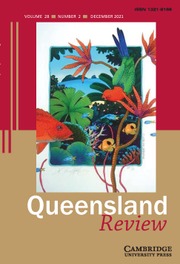Article contents
One Nation and Privatisation: Populist Ethnic Nationalism, Class and International Political Economy
Published online by Cambridge University Press: 26 February 2016
Abstract
The rise of ethnic nationalism (as expressed by the political ascent of Pauline Hanson and her One Nation Party) has created divisions within the Right of Australian politics and impediments to a privatisation program which had been proceeding under the aegis of the Labor Party and the Liberal-National Party Coalition over the last fifteen years. This paper focuses on how Pauline Hanson's One Nation Party has opposed privatisation of government assets on the basis that privatisation offers opportunities for subversive foreign capital to weaken national solidarity, which is conceived in ethnic and racial terms. The One Nation Party, this new anti-privatisation movement, is interpreted on two levels:
1 as one of a growing number of ethnic nationalist movements across the globe which are recurrent outcomes of hegemonic decline and increasing multipolarity in the world-system (e.g., the current situation of declining American hegemony being similar to the crisis of British hegemony in the interwar period of the early twentieth century)
2 as the outcome of neo-liberal policies (including privatisation) which have failed to produce full employment or to arrest the decline of the petite bourgeoisie, which forms the primary basis of the support for Hanson and her One Nation party.
- Type
- Research Article
- Information
- Copyright
- Copyright © Cambridge University Press
References
- 1
- Cited by




